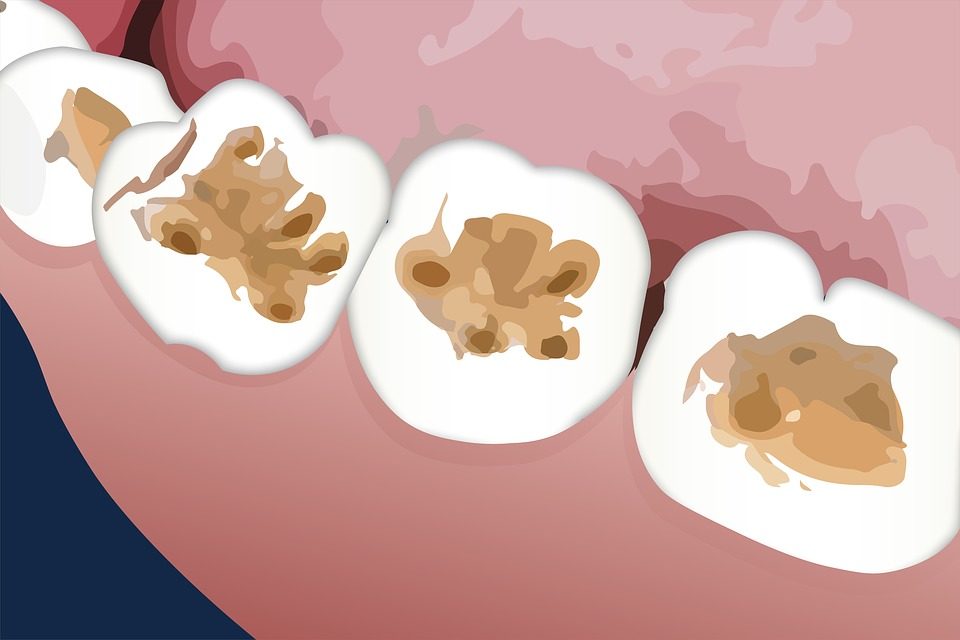Dental erosion is the loss of tooth structure that is caused by acids found in your diet. Acidity found in certain foods, drinks, and even your stomach acid can dissolve tooth minerals which leads to loss of tooth surface. The outer layer of your teeth is protected by a hard layer called enamel and is considered one of the hardest mineral substances found in the human body. Despite its robustness, heavily processed foods and highly acidic drinks can easily melt away enamel.
Consuming too much sugar can cause enamel to wear out because of increased plaque bacteria. If your teeth are frequently exposed to acids, the tooth enamel weakens and wears off over time. For example, if you drink a fruit juice or fizzy cola, it takes a while for the saliva to restore the pH levels in your mouth to a neutral state. This process ensures that your teeth are protected from acids that could melt away enamel.
Today we’ll be talking about dental erosion and find out what steps you need to take to protect your tooth enamel.
What causes dental erosion?
One of the main culprits of enamel erosion are highly acidic foods. When you eat foods that are acidic, it softens the enamel on your teeth for a short period of time. Your saliva cancels this out by balancing the pH levels in your mouth, but if this acid attack happens too frequently then your teeth does not have a chance to repair itself.
The softened enamel melts away and are sometimes removed when you brush your teeth. Foods that can contribute to dental erosion are:
- Processed meats.
- High-protein supplements and foods.
- Sweetened beverages and fizzy drinks.
- Sugary foods such as candy bars and ice cream.
- Wine.
When you continue consuming acidic foods, this can contribute to other dental problems such as tooth decay, tooth pain, tooth discoloration, and your teeth are more prone to cracking and chipping.
Stomach acid can also contribute to dental erosion. Medical conditions such as gastro-esophageal reflux can cause stomach acids to come up in the mouth and wear out tooth enamel. Frequent vomiting can also contribute to dental erosion, especially in people who have esophageal problems or who consume too much alcohol.
How can my diet prevent dental erosion?
Fixing your diet is the best way to prevent dental erosion. Ideally, you want to cut back on sugary drinks and foods, especially sodas and ice cream. Any foods that have a pH value of below 5.5 can harm your teeth and compromise its structural integrity. Sports drinks are not an exception since these contain sugar as well.
Natural fruit juices contain high acid concentrations, especially lemon and orange juices. If you’re going to have an acidic drink, try to consume it once per day. This will allow the enamel on your teeth to repair itself so it remains healthy and strong.
Drinking milk is beneficial since it restores the pH levels in your mouth back to normal after consuming acidic foods. Drinking plenty of water is still the best recommendation to prevent dental erosion. Keeping yourself hydrated throughout the day can also prevent dry mouth which can contribute to bad breath.
How can I protect my teeth from dental erosion?
There are several different ways to protect your teeth from dental erosion. To ensure that your tooth enamel stays healthy and strong, consider following the tips listed below:
- Drink plenty of water.
Drinking plenty of water is vital for maintaining the overall health and longevity of your teeth. Good quality saliva is produced when you keep yourself hydrated which is important for balancing pH levels in your mouth.
- Use a good-quality flouride toothpaste.
Fluoride toothpaste helps strengthen tooth enamel and prevents tooth decay. Ideally, you’d want to brush your teeth at least twice a day or in between each meal to keep dental erosion at bay.
- Use a soft-bristled toothbrush.
Choose a soft-bristled toothbrush for brushing your teeth. The soft bristles can get into tight spaces in your teeth and provide a deeper clean. Make sure to brush your teeth gently and work around different areas of your teeth. Brushing too hard can wear out tooth enamel which can cause dental erosion.
One mistake people make is brushing their teeth immediately after drinking soda. This does not help prevent dental erosion as it will only brush away the softened tooth enamel. Wait for about at least one hour before brushing your teeth to allow enough time for the mineral content to build up and harden your enamel.
- Limit your consumption of acidic foods.
To greatly reduce your risk of dental erosion, it’s best to limit your consumption of acidic foods throughout the day. Consuming fizzy drinks and sweets over the course of a few hours can soften your tooth enamel and expose you to dental erosion.
- Chew sugar-free gum after eating acidic foods.
Chewing sugar-free gum after consuming acidic foods can help minimise dental erosion. The gum will stimulate saliva production which is essential for balancing pH levels in your mouth. Avoid chewing gum with added sugars as this can contribute to dental erosion.
How is dental erosion treated?
If the enamel on your teeth has severely worn off, your dentist will perform tooth bonding and applied it to damaged teeth to reinforce its structural integrity. This covers up any discolorations caused by dental erosion and protects your teeth from further damage. Sometimes crowns and veneers are added to prevent tooth decay.
The best way to treat dental erosion is to prevent it from happening. By limiting the consumption of acidic foods, you can minimise the damage of dental erosion. Good oral hygiene practices are also important for the health and longevity of your teeth.
Conclusion
Dental erosion can easily be avoided by fixing your diet. Watch what you eat and make sure to brush your teeth twice a day to prevent tooth enamel from wearing out. Give these tips a follow to minimise your risk of dental erosion. It is always advisable to speak with your local dentist in Joondalup for expert advice.

